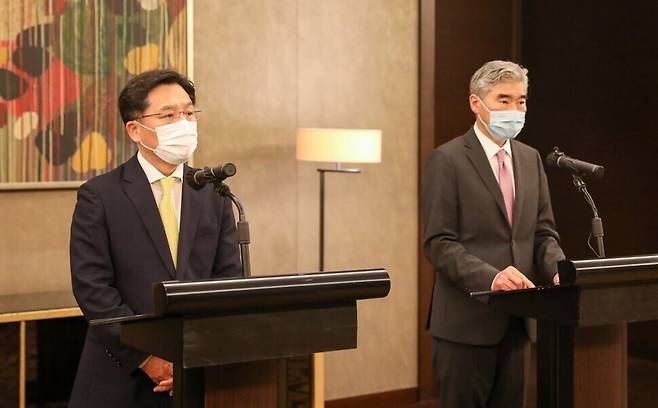Flurry of high-level talks between US, S. Korea rekindle hope for dialogue with N. Korea
전체 맥락을 이해하기 위해서는 본문 보기를 권장합니다.
An end-of-war declaration, Noh said, "could create an opportunity for resuming important kinds of dialogue right now."
He called it "a significant starting point for dialogue that could lead to complete denuclearization and the establishment of lasting peace on the Korean Peninsula."
이 글자크기로 변경됩니다.
(예시) 가장 빠른 뉴스가 있고 다양한 정보, 쌍방향 소통이 숨쉬는 다음뉴스를 만나보세요. 다음뉴스는 국내외 주요이슈와 실시간 속보, 문화생활 및 다양한 분야의 뉴스를 입체적으로 전달하고 있습니다.

Amid a series of high-level deliberations between South Korea and the US, attention is focusing on whether the two countries can find a way to resume dialogue with North Korea, perhaps by pushing for an official end to the Korean War. An end-of-war declaration is something that South Korean President Moon Jae-in has repeatedly proposed.
“I expect there will be full-fledged deliberations at the working level on several ways [to resume the Korean Peninsula peace process], including an end-of-war declaration,” said Noh Kyu-duk, special representative for Korean Peninsula Peace and Security Affairs, while visiting Washington, DC, on Saturday, following a trip to Russia.
An end-of-war declaration, Noh said, “could create an opportunity for resuming important kinds of dialogue right now.”
He called it “a significant starting point for dialogue that could lead to complete denuclearization and the establishment of lasting peace on the Korean Peninsula.”
Noh also said that Seoul intends to have a discussion with the US government about the implications that an end-of-war declaration would have for maintaining stability in Korean Peninsula affairs and continuing dialogue with North Korea.
Noh will be holding talks with Sung Kim, the US special representative for North Korea, on Monday in their capacity as the two countries’ top envoys for the North Korean nuclear issue. On Tuesday, Noh will meet with Takehiro Funakoshi, director-general of the Asian and Oceanian Affairs Bureau at Japan’s Ministry of Foreign Affairs, for bilateral talks about the North Korean nuclear issue, along with trilateral talks to be joined by Kim, representing the US.
This meeting between the three countries’ nuclear envoys for North Korea comes a little over a month since their previous meeting in Tokyo, Japan, on Sept. 14. Noh and Kim last met 18 days ago on Sept. 30 in Jakarta, Indonesia.
These are just the most recent talks in a flurry of high-level deliberations between South Korea and the US since Moon’s address at the UN General Assembly on Sept. 21 and North Korean leader Kim Jong-un’s policy speech at the Supreme People’s Assembly on Sept. 29.
Suh Hoon, director of the Blue House National Security Office, provided a detailed explanation of the South Korean government’s plan for an end-of-war declaration in a meeting with US National Security Advisor Jake Sullivan on Tuesday, Oct. 12.
After South Korean Foreign Minister Chung Eui-yong met with US Secretary of State Tony Blinken on the sidelines of the UN General Assembly on Sept. 22, the two diplomats held another brief meeting, at Chung’s request, while attending the OECD Ministerial Council Meeting on Oct. 5.
On Wednesday, CIA Director William Burns made his first visit to South Korea since assuming the post and paid a courtesy call on Moon. US Director of National Intelligence Avril Haines will reportedly be visiting South Korea this week for a meeting with top intelligence officials from South Korea and Japan.
This string of high-level discussions is prompting some to wonder whether change may be in store for the Korean Peninsula, including inter-Korean affairs. But the South Korean government isn’t anticipating any significant changes right away.
“Those meetings were all organized separately,” a government official said, explaining that the similar timeframe was coincidental. That explanation is reinforced by the fact that the administration of US President Joe Biden remains cautious about making an end-of-war declaration.
That said, the Americans have expressed their openness to resuming dialogue with North Korea. Considering that the motivations behind the US intelligence chiefs’ visit to South Korea remain unconfirmed, it’s hard to say what the outcome will be.
Given Moon’s determination to make progress on the Korean Peninsula peace process, including an end-of-war declaration, before leaving office, it’s likely that he’ll seize these meetings as a chance to make his case to the US.
By Kim Ji-eun and Hwang Joon-bum, staff reporters
Please direct questions or comments to [english@hani.co.kr]
Copyright © 한겨레신문사 All Rights Reserved. 무단 전재, 재배포, AI 학습 및 활용 금지
- 이재명 “유동규 개인적으로 배신감… 인사권자로 깊이 사과”
- 8명 모임 허용 첫날 “연말특수 기대” “저녁 회식은 좀…”
- 10조 늘어난 세수 올해 못쓴다…쓸 데는 많은데 왜?
- “첫 이틀은 우주멀미 체험…화장실도 ‘우주 뷰’랍니다”
- 국힘 대선주자들 “적반하장, 꼬리 자르기”…국감 나온 이재명에 공세
- [KSOI]이재명 32%-윤석열 32.9%, 이재명 31.5%-홍준표 27.5%
- 비트코인 가격 6개월만에 역대 최고가 근접…8천만원 육박
- 국힘 “국제마피아파한테 돈 받아” 주장에 이재명 “무혐의 종결”
- 생활치료센터→집 100㎞… 현금14만원 ‘방역택시’ 타라니
- [단독] 유동규 비밀TF, 대장동 틀 짜고 ‘시장님 회견문 검토’까지